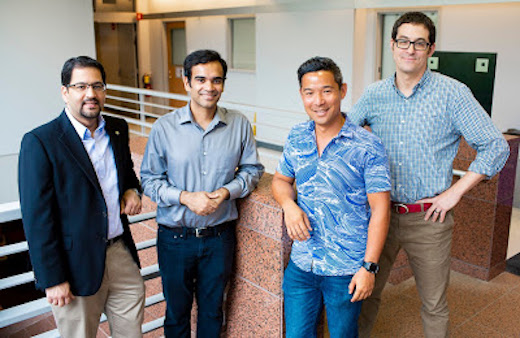Anti-clotting drugs for patients on life support, sensitive electrodes scientists can use to probe nerves and muscles, or an automatic labor-saving cell culture system.
All were potential products that Emory students brought closer to the marketplace in the last few months through the Emory Biotech Consulting Club, which pairs student advisory teams with startup companies — or partly substantiated ideas — emerging from university research. The Club held its Gala Wednesday evening, with a set of four presentations by student advisory teams on market research or other goals set by their clients.
One of those clients was Muscle Polymer, a fledgling outfit that produces flexible multi-electrode arrays for recording neuromuscular activity. The flexible electrode arrays have been used to study neuromuscular signals in songbirds and other organisms.
Bryce Chung, a postdoc in Emory biologist Sam Sober’s lab, created the electrode arrays together with Sober and electrical engineers Muneeb Zia and Muhannad Bakir at Georgia Tech. The electrode array technology was developed with the support of the McKnight Foundation, with ongoing support from the Simons Foundation and the National Institutes of Health.
"Our device will be the first to let researchers and clinicians record high-resolution electrical activity simultaneously from the large number of muscles controlling a complex behavior,” Sober says.
The arrays are currently manufactured at Georgia Tech and assembled at Emory, and have been supplied to over a dozen laboratories at Emory and at other universities. The inventors think that they could be used in a variety of scientific and clinical contexts, including prosthetics and brain-machine interfaces. They have developed a work flow for making customized products, and are organizing a workshop for scientists so they can learn how to use them in their research.
“We advised them to build their scientific client base in the short term, but eventually, they will want to enter the clinical neurology space,” said graduate student Sabrina Lynn, one of a five-person team advising Muscle Polymer.
The students also advised Muscle Polymer on pricing its products and developing a service package to offer customers, including training, troubleshooting and data analysis. Muscle Polymer could be entering a competitive market, with big players such as Medtronic, they noted.
Other projects showcased by the Emory Biotech Consulting Club included:
- InvenTech Solutions, an automatic system for exchanging growth media in cell culture dishes developed by biomedical engineers Martin Tomov and Vahid Serpooshan
- Anti-Platelet Therapeutics, drugs aimed at staving off blood clots in vulnerable patients undergoing ECMO (extracorporeal membrane oxygenation), a life support machine that replaces the heart and lungs. These potential drugs, based on antibodies to clotting factors, have been developed by blood clotting expert Renhao Li.
- Doc in a Box, a proposal for a kit containing basic equipment, such as a blood pressure cuff and thermometer, to supplement telehealth appointments. This came from internal medicine resident Matthew Brown.
In Anti-Platelet Therapeutics’ case, part of the challenge was estimating how many people undergoing ECMO develop blood clotting problems, since the prevalence of “acquired von Willebrand syndrome” in ECMO is not known. For Doc in a Box, the students ended up helping inventor Brown prepare to enter the Connected Patient Challenge contest run by Boston Scientific.
The Emory Biotech Consulting Club was co-founded in 2018 by Emory chemist Bill Wuest, who participated in similar activities during graduate school at the University of Pennsylvania. He wanted to provide an opportunity for graduate students and other young scientists to develop new skills and make connections as part of exploring non-academic career options.
Some of the students who started the Club, including former president Erika Csatary, were in Wuest’s lab. Csatary has already finished her doctorate and is now working for technology licensing office at Ohio State. For this season, the Club’s advisory teams included graduate students as well as others from Goizueta Business School, undergraduates and other professional students.
Laney Graduate School dean Lisa Tedesco said the club was an example of how graduate education should “meet students where they are” and respond to shifting career landscapes. The Graduate School has supported the Club’s budget since soon after its founding.
“You’re engaging with a practical, real-world problem, with a team of students from different fields,” Tedesco told the group on Wednesday. “I’m thrilled with the cross-disciplinary work you’re doing.”
The Club is also supported by Emory’s Office of Technology Transfer, which works with student organizers to recruit companies for each season. This was the Club’s 4th season, and its second Gala that was conducted virtually; participants expressed the hope that the next could be in person.

